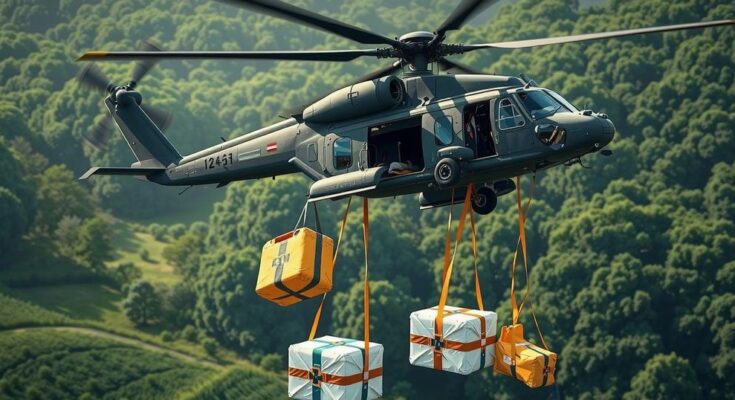Critically injured South African peacekeepers have been evacuated from Congo by UN forces after sustaining injuries in combat last month. The M23 rebels, supported by Rwandan troops, control Goma and have caused significant casualties. Concerns regarding the preparedness and discipline of South African troops have arisen amid the ongoing violence and scrutiny of military operations.
A group of critically injured South African peacekeepers have been evacuated from eastern Congo by the United Nations, following their injuries sustained in combat last month. The South African National Defense Force confirmed their return to South Africa but did not disclose the exact number of repatriated soldiers. These individuals had been under medical care in a hospital located in the rebel-held city of Goma, which has been a focal point of conflict due to the advance of M23 rebels.
The city of Goma, with a population of 2 million, has been under the control of Rwandan-backed M23 rebels since January, raising concerns among the international community regarding their rapid offensive in the resource-rich area. The United Nations has been advocating for the reopening of Goma airport to facilitate such evacuations. Reports indicate that the M23 rebels occupy major urban centers including Goma and Bukavu, with their actions leading to significant civilian casualties, estimated at around 7,000 lives lost according to Congo’s statements.
The South African National Defense Force has announced that another group of soldiers is expected to return home later this week. According to a union representative, more than 100 South African sick and injured soldiers are currently being evacuated, with three individuals in dire need of urgent medical attention. The report also mentions the evacuation of two pregnant female soldiers, although a defense spokesperson refrained from commenting on this matter.
The evacuation is believed to have been conducted via neighboring Rwanda. In January, 14 South African peacekeepers lost their lives during clashes between Congolese government forces and the M23 rebels, a tragedy which further highlighted the risks involved. The South African Minister of Defense attributed their deaths to being caught in crossfire as the rebels made their push toward Goma, while President Cyril Ramaphosa indicated they were victims of direct rebel aggression.
Questions have emerged regarding South Africa’s role in a regional peacekeeping force amid scrutiny over the preparedness and equipment of its soldiers. Political parties and defense unions have expressed concerns regarding the operational readiness of the troops. Furthermore, the discipline of South African troops has been called into question due to prior misconduct allegations resulting in the recall of a contingent earlier in the year. This southern African force, which includes troops from Malawi and Tanzania, is intended to succeed the existing U.N. peacekeeping unit, MONUSCO, whose planned withdrawal is currently on hold.
The conflict has also claimed the lives of at least three Malawian soldiers in January, prompting Malawian President Lazarus Chakwera to signal intentions for troop withdrawal, indicating the immense challenges faced by peacekeeping forces operating in a volatile environment such as eastern Congo.
The evacuation of critically injured South African soldiers by the United Nations underscores the ongoing dangers faced by peacekeepers in eastern Congo amidst the escalating violence of the M23 rebels. With scrutiny on South Africa’s military preparedness and discipline, the situation highlights the complex dynamics of regional peacekeeping efforts, further complicated by significant loss of life and calls for troop withdrawals from involved nations.
Original Source: abcnews.go.com




